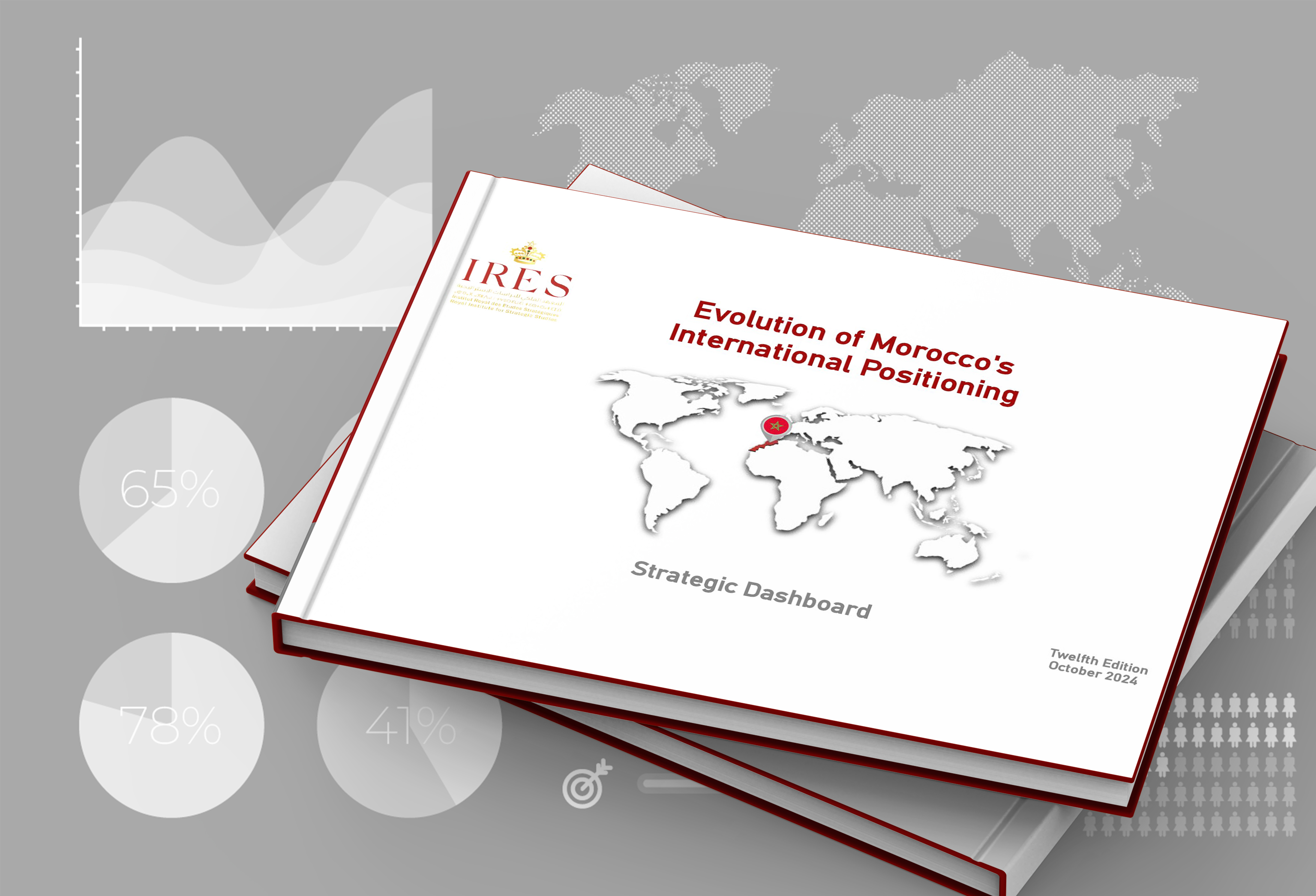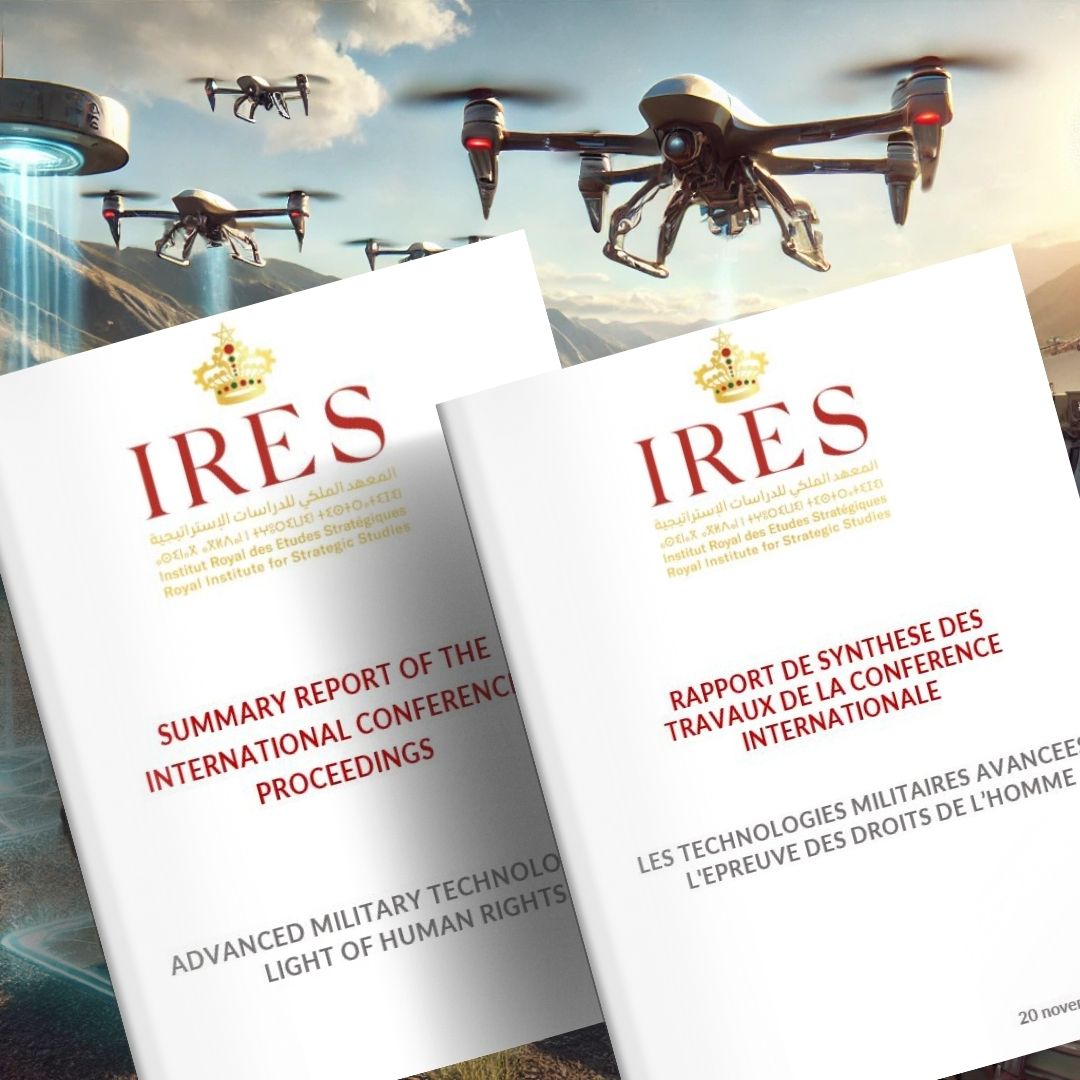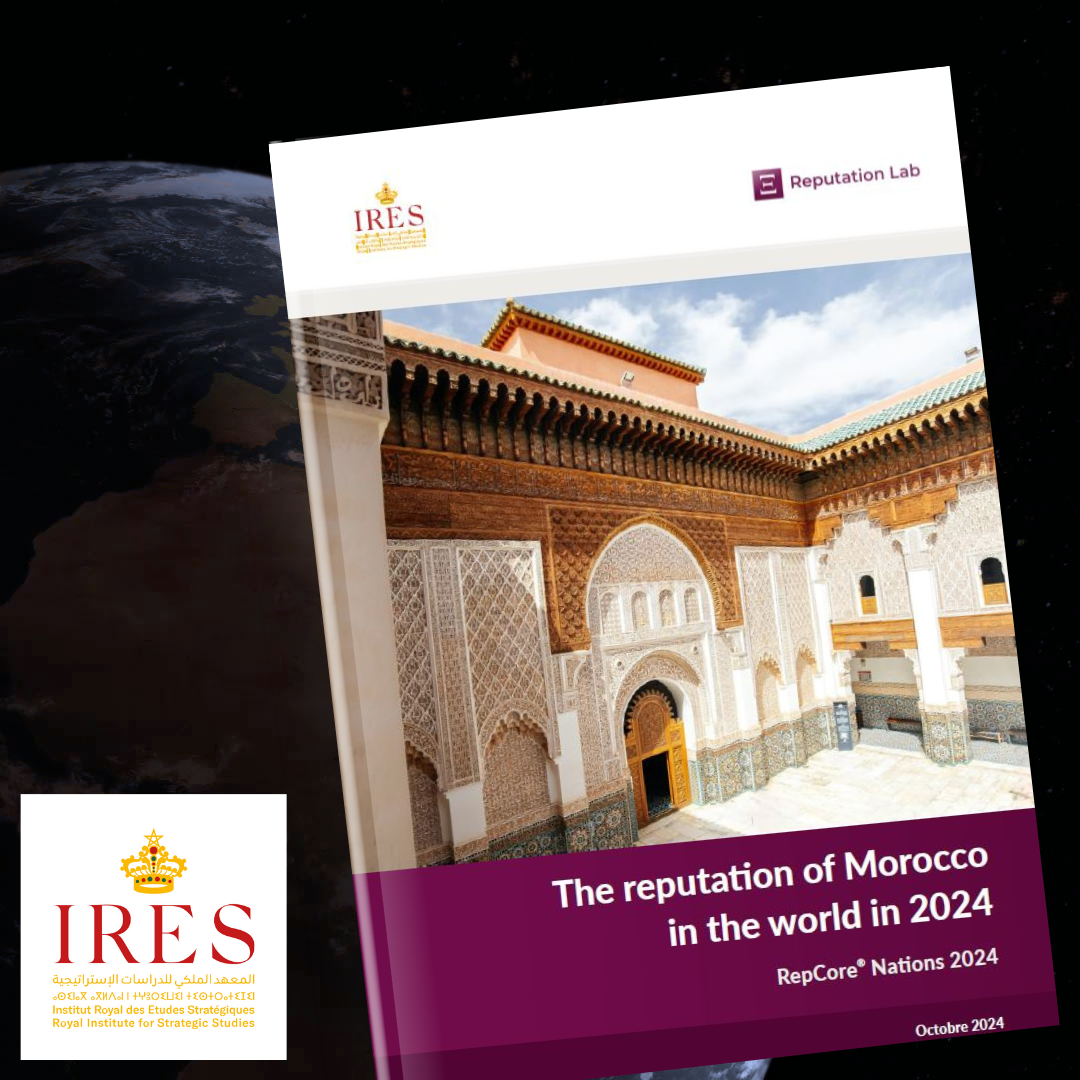
Strategic Dashboard: Evolution of Morocco's International Positioning (Twelfth Edition)
- Home
- Publications
- General Reports
- Strategic Dashboard: Evolution of Morocco's International Positioning (Twelfth Edition)

As part of its prospective monitoring mission-aimed at closely tracking the ongoing changes at the national, regional, and international levels, with a view to preparing Morocco for the world of tomorrow-, the Royal Institute of Strategic Studies (IRES) completed, in late October 2024, the 12th edition of its "Strategic Dashboard" series.
The Strategic Dashboard is one of the recurring outputs of IRES' "Prospective Monitoring" division. It serves as a tool to provide an overview and track the evolution of Morocco's international positioning in the political, economic, social, cultural, and environmental fields.
A mine of quantitative information and knowledge useful for decision-making, the Strategic Dashboard includes 189 strategic indicators.
The various indicators presented in this report are classified according to the five pillars of IRES' interpretive framework, namely:
- Governance : the entirety of collective action management processes, based on the direction of actors' behaviors (bottom-up), the mobilization, and the motivation of "agents" (coordinated actions, soft power).
- Human-centric : all developments and aspirations that contribute to reshaping Humanity, in its uniqueness as well as in its sociability, in its relationship with machines, work, and its living environment...
- Nature-centric : the search for a different relationship with the living world, an economy more respectful of the environment, and a lifestyle less focused on consumption; the awareness that we must now take care of nature and all living things.
- Planetarization : a new stage of disruptive progress, during which a state of globalism (post-globalization) coexists with a new awareness of the "living" quality of the planet, as a biosphere in which humans are merely one component.
- Exponentiality : the set of structural phenomena that are experiencing exponential acceleration, such as communication technologies, digitalization, demographics, economic competition, financialization, social inequalities, ...
Given the interdependencies between the dimensions of the two pillars "Nature-Centric" and "Planetarization", the related indicators have been grouped into the same section.
This new edition has been enriched by the integration of new strategic indicators related, in particular, to government effectiveness, financial opacity, risk resilience, sustainable competitiveness, green energy investment, youth perspectives, digitalization, artificial intelligence, cyber security, culture, and sport.
The number of indicators identified per pillar/sub-pillar does not presuppose the importance of the latter. It is often dependent on the availability of statistical data related to the relevant domain.
Some of these indicators have limitations that have been highlighted by several studies. According to IRES, they do not reflect the progress made by Morocco. Their inclusion in this Strategic Dashboard is solely due to the fact that these indicators are considered by international organizations to assess the country's situation.
Some indicators, with data dating back to 2016, which were included in previous editions, have been removed from the 2024 edition due to the cessation of their publication by the relevant organizations.
Information related to the various indicators has been gathered from a variety of sources, including national bodies such as the High Commission for Planning (HCP), ministerial departments, the Office des Changes, and international institutions such as the World Bank, IMF, OECD, UNDP, WHO, FAO, and CEPII.
For each indicator, alert thresholds are determined by IRES. Recognizing that no universal method exists, the calculation of alert thresholds for each indicator has been carried out using different methods. The most commonly used methods are two in number.
The first method involves, in cases of abundant information, distinguishing three groups within the international community, each containing the same number of countries. The thresholds are thus defined by the averages of the middle and upper thirds of this community. In cases of limited data availability, the second method used involves setting the following as thresholds:
- the averages established by international organizations, namely:
- - the UNDP for countries with medium and high human development,
- - the standards set by international organizations such as the WHO and the IMF.
- the standards set by international organizations such as the WHO and the IMF.
Illustrative dashboards showing Morocco's positioning relative to these alert thresholds were generated through the compilation of the Strategic Dashboard's statistical data on the "Power BI" Business Intelligence platform, implemented by IRES in June 2023.
The analysis of this positioning and its evolution over time is the focus of this report. The number of places gained or lost in Morocco's international ranking is assessed on a constant scope basis.
The analysis of the results of the twelfth edition of the Strategic Dashboard revealed that Morocco enjoys, overall, a positioning:
- favorable in terms of indicators related to attachment to the national constants and identity values, universal school enrollment, combating hunger, basic living conditions (access to water, electricity, and sanitation), intangible capital per capita, fertility control, low contribution to climate change, maritime connectivity, traditional solidarity, open data, investment, antimoney laundering, global security, contribution to international peace and security, and external reputation;
- intermediate concerning indicators related to global governance, the rule of law, health security, efficiency of public institutions, perception of corruption, urban lanning, ecological footprint, energy transition, competitiveness and global attractiveness of the country, air connectivity, the financial system, economic reedom, human development and social well-being, women's empowerment, preparedness for disruptive technologies, e-learning, digital inclusion, the nowledge economy, and institutional solidarity;
- inadequate when it comes to overall wealth per capita, food, water, and energy sovereignty, availability of water resources, quality of the education system, research & development, healthcare financing model, medical supervision, development of smart cities, political links, freedom of the press, and social mobility.
In terms of the evolution over the past twenty years of Morocco's international positioning (see the following summary table), the main advances are related, among others, to security and military power, reputation, soft power, the fight against hunger, poverty reduction, school enrollment and literacy, basic living conditions (access to water, electricity, and sanitation), road and rail density, life expectancy, women's emancipation, the environment (relatively low levels of greenhouse gas emissions), immunization coverage, the fight against money laundering, interpersonal trust, and institutional trust. In contrast, the decline in Morocco's international positioning concerns the availability of water resources, food sovereignty, economic growth, income inequality, economic freedom, the perception of happiness, and youth prospects.
The Kingdom's international ranking has remained stable in relation to indicators such as attachment to the Nation, governance, perception of corruption, overall wealth per capita, intangible capital, prosperity, access to the healthcare system, medical and paramedical support, preparedness for artificial intelligence, digital transformation, and traditional solidarity.
In light of the above and with the aim of significantly improving its international positioning in the future, Morocco should undertake large-scale reforms in areas related to intangible capital, notably human capital, social capital, "knowledge and technology" capital, and institutional capital. The Kingdom should also seriously consider the new paradigms of water, food, health, and energy sovereignty, within the context of both international and national challenges marked by the acceleration of climate change.




